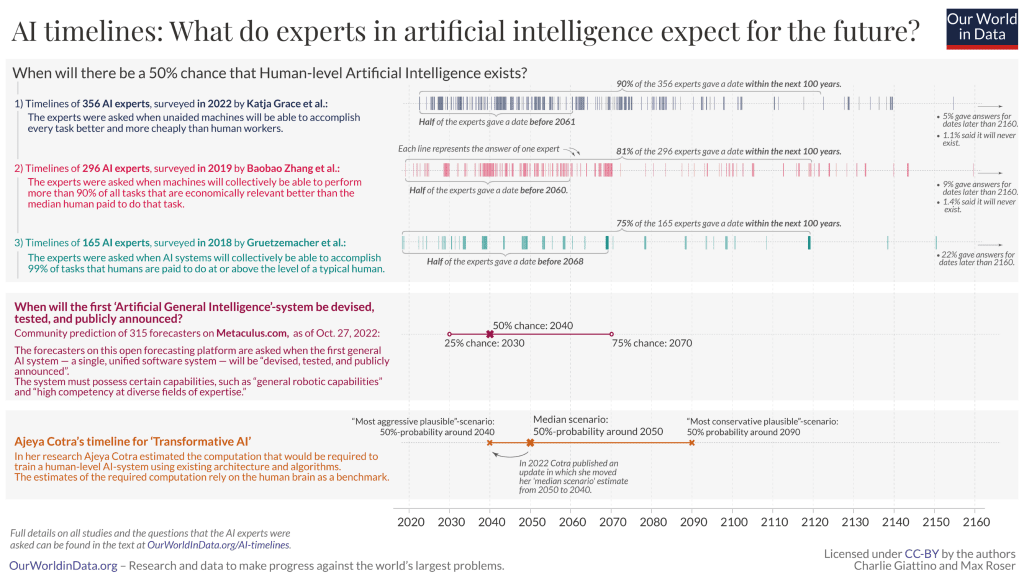This is a guest post by our founder: Alex Benincà
Do We Still Need Developers? How Will This Affect Us and Our Companies?
Artificial Intelligence (AI) is revolutionizing industries across the globe, and software development is no exception. This comprehensive analysis explores the future of software development with AI over the next decade, focusing on three key time frames: the next 2 years, the next 5 years, and the next 10 years. The article is particularly relevant for tech founders, CEOs, CTOs, and marketing managers seeking to understand how these changes will impact their roles, teams, and overall business strategies.
Part 1: The Immediate Future (Next 2 Years)
In the next two years, AI will start to significantly transform the software development process. Tools like GitHub Copilot and Amazon CodeWhisperer will automate routine tasks, leading to enhanced productivity and higher-quality code. This immediate integration of AI is not just about improving efficiency; it marks a strategic evolution in how software is developed and maintained.
AI Tools: Enhancing Productivity and Quality
AI tools are set to revolutionize the development landscape by taking over repetitive tasks. For example, GitHub Copilot, leveraging machine learning models trained on vast datasets of public code, provides context-aware code completions. This not only speeds up the coding process but also helps maintain coding standards across teams. According to GitHub, Copilot can reduce coding time by up to 30% (GitHub, 2023).
The Evolving Role of Developers
Despite the advancements in AI, developers will remain indispensable. Their roles will evolve from routine coding tasks to higher-level problem-solving and innovation. Developers will need to upskill, gaining proficiency in AI and machine learning to stay relevant. This transition requires a combination of technical expertise and strategic insight to effectively harness AI’s capabilities.
Business Implications
For companies, AI integration in software development brings numerous advantages. Faster development cycles and improved software quality will lead to higher customer satisfaction and a competitive edge. AI’s real-time bug detection and resolution capabilities will result in more robust and reliable software, reducing post-release maintenance costs (World Economic Forum, 2024).
Human Resources and Budget Shifts
The adoption of AI will also impact human resources and budgets. Initially, there may be a reduced need for entry-level developers as AI takes over repetitive tasks. However, the demand for AI specialists, data scientists, and product owners with AI expertise will rise. Companies will need to invest in training programs to upskill their existing workforce and shift budgets towards acquiring and maintaining AI infrastructure.
Strategic Recommendations
To effectively navigate this transition, businesses should:
- Invest in Training: Equip your development team with AI and machine learning skills through targeted training programs.
- Adopt AI Tools: Integrate AI tools into your development processes to automate routine tasks and enhance efficiency.
- Focus on Innovation: Encourage developers to focus on strategic problem-solving and innovation, leveraging AI to improve software quality and speed.

At B-Works, we specialize in guiding businesses through AI-driven transformations. Our digital strategy consulting services can help you seamlessly integrate AI into your software development processes.
Part 2: The Mid-Term Future (Next 5 Years)
In the next five years, AI’s role in software development will deepen, further transforming practices and processes. By 2027, it is expected that 70% of developers will use AI-powered coding tools. AI will not only modernize legacy code but also manage technical debt and enhance user experiences through predictive analytics and conversational interfaces.
Expanding AI Capabilities
AI tools will advance beyond simple code suggestions. They will be capable of understanding and improving upon existing codebases, ensuring better performance and scalability. Tools like OpenAI’s Codex will become more sophisticated, offering deeper insights and more accurate predictions for code improvements.
The Role of Developers in 5 Years
The role of developers will continue to evolve. While the need for traditional coding tasks will diminish, developers will become essential for training AI models and overseeing AI-driven projects. This will require new skills in AI, machine learning, and data science, along with a strategic understanding of how to leverage these technologies to meet business goals.
Impact on Companies
Companies will benefit from AI’s ability to automate more complex tasks. This will lead to increased agility and reduced technical debt, as AI helps to streamline maintenance and updates. The focus will shift towards innovation and strategic initiatives, with AI handling much of the routine coding and maintenance.
Human Resources and Budget Implications
As AI becomes more entrenched in development processes, there will be a reduced need for traditional developers but a growing demand for AI specialists, data scientists, and cybersecurity experts. Budgets will increasingly be allocated towards advanced AI tools, infrastructure, and continuous learning programs for employees to keep up with AI advancements.
Strategic Recommendations
To effectively navigate this mid-term future, businesses should:
- Enhance AI Training: Develop comprehensive training programs focused on advanced AI and machine learning techniques.
- Strengthen Data Management: Invest in robust data management systems to support AI’s growing role in software development.
- Innovate Continuously: Foster a culture of continuous innovation, encouraging teams to experiment with AI-driven solutions and integrate them into business strategies.
At B-Works, we help businesses prepare for these changes, ensuring they can leverage AI to drive growth and innovation.
Part 3: The Long-Term Future (Next 10 Years)
In a decade, AI will fundamentally change the landscape of software development. We will see the rise of “Software 2.0,” where AI autonomously writes and optimizes code, standardizing processes and integrating seamlessly into DevOps. This evolution will redefine software engineering, demanding new skills and strategic oversight.
Autonomous AI Development
AI will reach a level of sophistication where it can autonomously develop and improve software. This includes everything from writing new code to optimizing existing systems. AI’s ability to learn from vast amounts of data will allow it to create highly efficient and scalable software solutions.
The New Role of Developers
Developers will transition into roles that focus on high-level decision-making, system design, and strategic oversight. They will be essential for guiding AI-driven projects, ensuring ethical practices, and aligning AI outputs with business objectives. Continuous learning and adaptation will be critical as technology evolves.
Impact on Companies
Companies will achieve unprecedented levels of efficiency and innovation. The reduced need for manual coding will lower costs and increase scalability, allowing businesses to respond faster to market changes and customer needs. Strategic leadership and continuous learning will be crucial to leverage these advancements fully (OpenAI, 2024).
Human Resources and Budget Shifts
There will be a high demand for AI developers, data scientists, and cybersecurity experts, while the number of traditional developer roles will decline. Budgets will focus on AI infrastructure, advanced analytics tools, and AI-driven security solutions. Training and development budgets will prioritize upskilling employees to handle AI-driven workflows and innovations (Gartner, 2023).
Strategic Recommendations
To prepare for this transformative future, businesses should:
- Invest in AI Infrastructure: Build robust AI infrastructure to support autonomous development and advanced analytics.
- Focus on Continuous Learning: Establish continuous learning programs to keep your workforce updated on the latest AI advancements.
- Strategic Oversight: Ensure strategic oversight to guide AI initiatives, maintaining alignment with business objectives and ethical standards.
Conclusion and takeaway
The future of software development with AI promises a transformative journey, requiring businesses to adapt and innovate continuously. At B-Works, we are at the forefront of these changes, helping companies harness the power of AI to stay ahead in the digital age. Ready to future-proof your organization?
Contact us today for more details on partnering with us, and claim your free 30 minute expert review.
Contact us about your ideas - we help companies worldwide
Sources
- GitHub. (2023). “Copilot.” Available at: https://github.com/features/copilot [Accessed 8 July 2024].
- Brainhub. (2024). “Is There a Future for Software Engineers? The Impact of AI.” Available at: https://brainhub.eu/ [Accessed 8 July 2024].
- World Economic Forum. (2024). “Top 10 Tech Trends for the Next 10 Years.” Available at: https://www.weforum.org/ [Accessed 8 July 2024].
- Gartner. (2023). “Augmenting the Software Development Life Cycle with AI.” Available at: https://www.gartner.com/ [Accessed 8 July 2024].
- OpenAI. (2024). “Codex.” Available at: https://openai.com/index/openai-codex/ [Accessed 8 July 2024].
- McKinsey & Company. (2024). “The Future of Software Development”
- Ourworldindata.org. (2024). Available at: https://www.weforum.org/agenda/2023/02/experts-ai-developing-over-the-coming-years/ [Accessed 8 July 2024].
